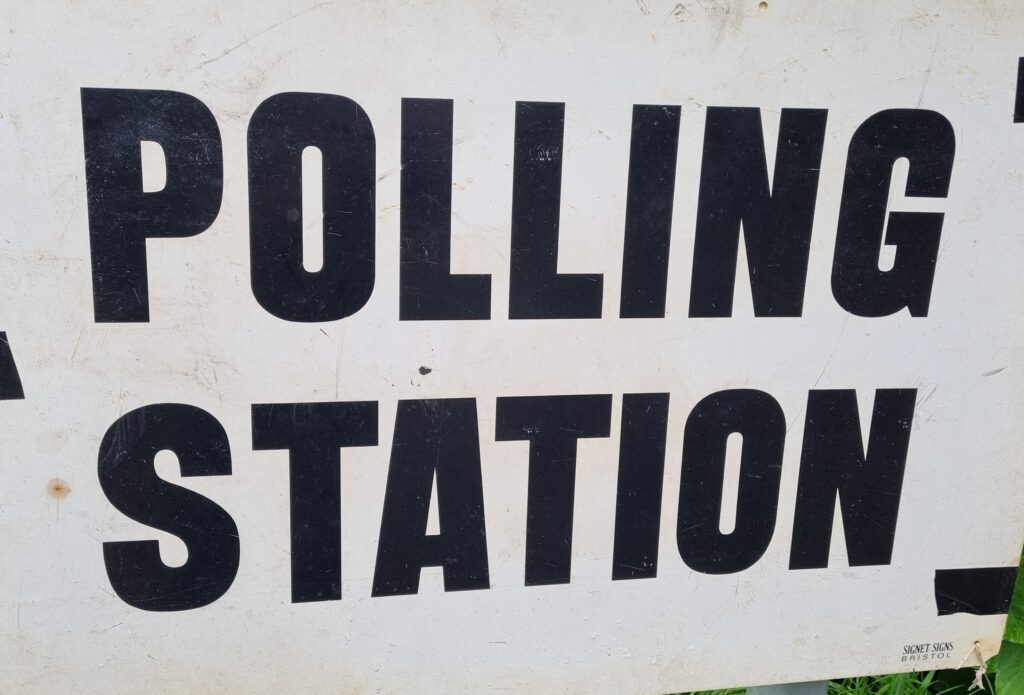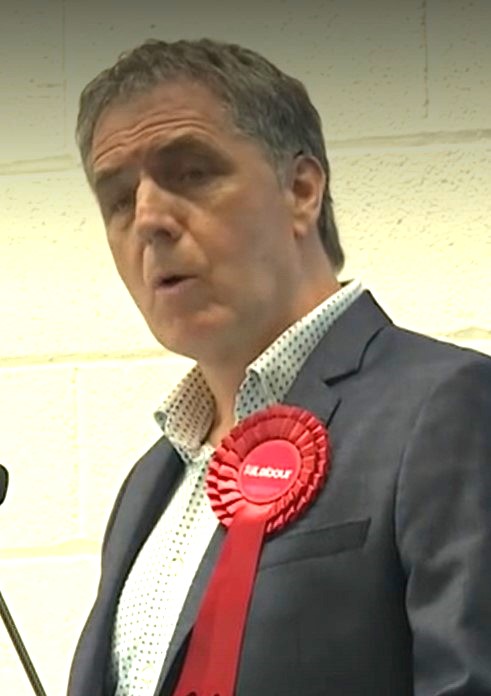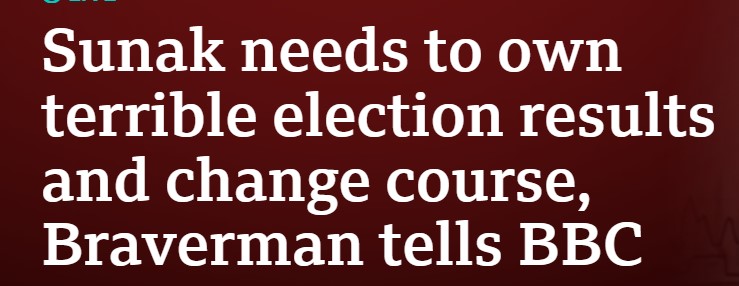 Editorial: Tories hammered, but warnings for Labour
Editorial: Tories hammered, but warnings for LabourThe main headline of last Thursday’s local election results is that the Tories got the battering they deserved and which everyone was expecting. But a secondary element in the outcome is that despite all its gains, Labour is haemhorraging votes because of Starmer’s shift to the right, his abandonment of previous commitments, and his stance on Gaza.
The Tories lost around half of the 900 seats they were defending and in the total number elected they came third nationally. In the 107 local authorities contested, the Lib-Dems now have more councillors than the Conservatives. The overall result, according to Sir John Curtice, the veteran elections expert, were “not far short” of catastrophic for the Tories and “one of the worst, if not the worst” result for the party in local elections for 40 years.
Mixed in with the local government horror show, the Tories also managed to lose the Blackpool South by-election, with a 26% swing to Labour, the third largest postwar swing. The previous Tory MP actually had a bigger majority of votes in 2019 than the new candidate managed got in total votes this time around. Even Kwasi Kwarteng, Chancellor under Liz Truss, was forced to admit to LBC that there is no such thing as a “safe” Tory seat any more.
Sadiq Khan positioned himself to the left of Starmer
Labour won most of the metro mayor contests and in Greater Manchester the Tories were smashed, gaining only 10%, compared to Andy Burnham’s massive 63%. In London, the great ULEZ ‘revolt’ failed to materialise, and Sadiq Khan easily won mayor, with 44% of the vote, 11 points ahead of the Tory candidate. It should be noted that Sadiq Khan’s sizeable win in London was in no small measure due to his position to the left of Starmer, by campaigning on free school meals, public ownership and house-building. He also spoke out in favour of a ceasefire in Gaza long before public opinion heaved Starmer in that direction.

Tory spokespersons are clinging desperately to a variety of thin straws to find something positive in the results, so they were focusing on hanging onto two metro mayors, in West Midlands and Tees Valley where both Conservative candidates had gone out of their way to dissociate themselves from their national party. But these provided only a single crumb of comfort, in Tees Valley, as Labour took the West Midlands, despite the fact that a pro-Palestinian candidate got nearly 12 per cent of the vote and much of that would have come from Labour.
But the elections were not an unqualified success for Starmer’s Labour Party, which has not been the main beneficiary of the collapse of the Tories. While the Tories lost 473 seats (at the time of writing), Labour only won 185 of them, not far short of the total combined gains of the Greens and Independents, the latter including many pro-Palestinian candidates opposed to Starmer’s policy on Gaza. Adding these to the Lib-Dems gains and a handful for Galloway’s mis-named Workers’ Party, it means that Labour’s successes were easily eclipsed by those of ‘third’ parties.
North East mayor result showed large Labour defections
Labour also failed to win Harlow Council and this provided more desperately-needed solace to the Tories. This council corresponds roughly to a key target constituency for Labour East, which also has its HQ in the town. Clearly, Keir Starmer’s visit to Harlow, the day before the voting, had the opposite effect to the one intended.
The result for North East mayor is also very significant. Although the former Labour North Tyne mayor, Jamie Driscoll, was defeated by a wide margin, 28% to Labour’s 41%. he still got 126,000 votes. Many Labour supporters were outraged at the disgraceful way he had been elbowed to one side by the Labour bureaucracy to make way for their chosen candidate, Kim McGuinness.

For many traditional Labour voters, Driscoll was seen as the ‘real Labour’ candidate. The main reason for his defeat was the strength of the tide of opinion running against the Tories and a general perception that Labour is seen as the most viable alternative. Many former Labour members and voters, angered at his treatment by the Party bureaucracy, voted for him, but they were outnumbered by the mass of workers who have no connections with, and no knowledge of, the internal machinations by the right-wing faction of the Party. It is that layer of workers who voted for McGuinness and who will vote Labour in their millions in the coming general election.
These elections have seen the Green Party significantly increase its number of council seats, largely as a result of younger voters abandoning Labour, just as Labour have abandoned them over climate change. The Greens made important gains in areas that in the past were solid Labour. It was the vote for the Green Party, taking away Labour votes, that may have lost the PCC election for Labour in Leicestershire. We would not blame the Greens for that – the responsibility lies squarely with Keir Starmer, for abandoning previous commitments.
Starmer alienated the young and Muslim voters
Starmer’s shift on climate change and his disgraceful policy on the genocide being committed in Gaza has lost Labour votes among younger and Muslim voters alike. In contrast to the national picture, where Labour’s vote increased on average by around 5 per cent, Labour lost support to the Greens and Independents in wards with large Muslim populations – by around 16 per cent compared with 2021.
In Newcastle, Bolton, Oldham, Rochdale, Manchester and elsewhere, Labour lost seats to the Greens and independents. Labour’s council leader in Bolton, Nick Peel, said the Israel-Hamas war had been a clear factor in the party’s results. “As a direct result of the ongoing humanitarian crisis in Palestine, many South Asian voters have not supported Labour or the Conservatives,”
While Starmer and the Shadow Cabinet have been drilled to ignore the question when it is put to them by journalists, Pat McFadden, Labour’s elections co-ordinator, admitted that the Gaza war was costing the party votes. “There’s no denying”, he said, “this is a factor in some parts of the country”.
What we need to consider is what these elections tell us about the forthcoming general election and what will happen beyond that. We always have to bear in mind the limitations of taking local elections as a guide to national politics, particularly because the turnout is always lower and even as local elections go, this was far from a UK-wide poll. Nevertheless, this is the last large-scale test of public opinion that there will be before the next general election.
As such, the results offer a grim foreboding to the Tory Party. They face an historic decline in their electoral fortunes, showing an unmistakeable downward trend over the last century. But it now looks highly likely that their percentage vote in the coming election will be their lowest for more than a century. There is hardly any political commentator, either in the Tory Party or in Labour who does not now believe that Labour will win the coming election. The only question is how big the majority will be.
This rotten and corrupt government has got to go
How big it will be will depend on two contradictory factors. The first is that there is a widespread and generalised feeling that this rotten and corrupt government has got to go. It has been in power for fourteen years, during which time it has presided over the biggest cuts in living standards for generations.

The Financial Times, on the day of the election, casually noted that“Consumers spent 15 per cent more over the two years to Q4 2023, the latest quarter for which data is available, although they bought 0.5 per cent fewer goods”. What is this, but an admission that in terms of spending (leaving aside rises in housing costs, which are greater), workers have suffered a cut in standards of 15% in two years?
Then there is the collapse and decay of public services, particularly local government and the NHS. There is hardly any aspect of national political life that is not beset by scandal, corruption and mismanagement by this government, and the greatest surprise of all is that British workers have not already been rioting in the streets.
There is an almost tangible surge of anti-Tory sentiment
This, then, is the key factor: a positive tsunami of opinion that is demanding an end to the nightmare, for the Tories to go, in the hope there can be something better. It has not been Starmer’s management of Labour that has won ground for the party in the polls – his personal poll ratings are far below those of the party – but an almost tangible surge, a powerful upswelling of anti-Tory feeling.
Despite the scepticism of many on the left – including many honest former Labour members, like Jamie Driscoll, most of whom were treated appallingly – this unstoppable tide of opinion is the most important single factor determining the outcome of the coming general election, as indeed it decided the outcome in the North East.
This is the overriding reason, as YouGov polls have shown, that the Tories are on their lowest vote share across a whole number of demographics. Even among those who voted Tory in the last election, only 43% intend to do so again. In almost every demographic category, the Tories are behind Labour.
But another factor which works in the oppose direction to this, also revealed on Thursday, is the ability of the Labour leadership to throw away votes by its relentless march to the right and, more recently, by its apparent support for anything the Israeli government wants to do.
It is not impossible that Starmer might yet lose more votes, as he is reported to be considering watering down yet another commitment – this time on workers’ rights. Starmer’s “homeopathic” approach to commitments – the more dilute they are, the more effective he thinks they will be – is a vote loser, not a winner and it remains to be seen how much his baleful leadership will denude Labour’s vote.
The balance between these contending factors will decide the size of the Labour majority. But for the moment, it looks like the first factor is greater than the second, and Labour will get a sizeable majority.
The Tories trajectory is towards an open split
As for the Tory Party, these results confirm its likely demise in the coming election, and its trajectory towards a formal split. The right wing are baying for Sunak’s blood, and Suella Braverman was quick to blame the Tory leader, making it clear that he had “ownership” of the debacle. It is not certain that this far right wing of the party can muster a majority in a much diminished parliamentary party they will have by 2025. The Tory Party as a whole are facing their worst nightmare – they will be haunted by the fate of the Canadian Conservative Party, which went from being the governing party to a rump of two seats in the 1993 federal elections.
Reform UK, which is the latest manifestation of Nigel Farage’s Brexit Party – the only party organised as a limited company (majority-owned by Farage) – has taken votes from the right of the Tory Party and their racist and xenophobic outlook fits nicely with the Braverman/Truss/Rees-Mogg wing of the Tories. At some stage, it is almost certain that there will be a new alignment on the right of UK politics, with these creatures either capturing the Tory party itself, or forming a major party to its right.
On the basis that Labour will form the next government, we have no illusions in Keir Starmer or his Shadow Cabinet. Their policies are Tory-lite at best. Labour’s right wing are kidding themselves, and much of the media, by pretending that Labour is likely to win because of the ‘changes’ Starmer has made to the Labour Party. On the contrary, polls consistently show that Labour voters are to the left of the Party and the Party membership is to the left of the leader.
Large weight of expectation on a Starmer government
The problem that Keir Starmer will have is that the bigger his majority – and it could be very big – the greater will be the weight of expectation placed on the new government. No amount of appeals for “patience” and “restraint” will placate the mood for meaningful improvements in the daily grind of life. Then the fireworks will start.
Whatever the wishes of the leaders of the trade unions, their members will not accept Austerity Mark II, especially if it comes dressed in ‘Labour’ livery. Real politics will kick off again in the Labour Party, starting with with dissent among the millions of affiliated members in the trade unions. There will be little the Labour bureaucracy will be able to do about it, as Labour once again becomes an arena of free discussion, debate and argument about the way forward, and about the meaning of real socialist ideas.
 Editorial: Hunt’s budget won’t save the Tories - Jeremy Hunt’s budget on Wednesday, as is usual for this government, was all smoke and mirrors. Pretending to help working-class people while doing the opposite,
Editorial: Hunt’s budget won’t save the Tories - Jeremy Hunt’s budget on Wednesday, as is usual for this government, was all smoke and mirrors. Pretending to help working-class people while doing the opposite, Editorial: Rochdale was a win for Palestine and a serious defeat for Starmer - Keir Starmer’s supine support for the Israeli onslaught on Gaza has cost Labour – at least his version of it – the parliamentary seat of
Editorial: Rochdale was a win for Palestine and a serious defeat for Starmer - Keir Starmer’s supine support for the Israeli onslaught on Gaza has cost Labour – at least his version of it – the parliamentary seat of Editorial: chaotic games in Parliament, while Gaza suffers - Two key lessons come out of the chaos in the House of Commons on Wednesday: that the Labour leadership is being dragged, kicking and screaming,
Editorial: chaotic games in Parliament, while Gaza suffers - Two key lessons come out of the chaos in the House of Commons on Wednesday: that the Labour leadership is being dragged, kicking and screaming, Editorial: Gaza war revealing underlying international splits - Where there was growing harmony between the interests of the ruling elite in Saudi Arabia and the capitalist class of Israel, the war in Gaza
Editorial: Gaza war revealing underlying international splits - Where there was growing harmony between the interests of the ruling elite in Saudi Arabia and the capitalist class of Israel, the war in Gaza Editorial: the wider impact of the war on Gaza - The savage war that Israel is conducting against the population of Gaza will have profound and lasting effects throughout the Middle East, including Israel. The
Editorial: the wider impact of the war on Gaza - The savage war that Israel is conducting against the population of Gaza will have profound and lasting effects throughout the Middle East, including Israel. The
